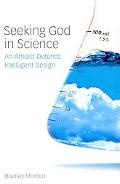

 |

|

The average rating for Seeking God in Science: An Atheist Defends Intelligent Design based on 2 reviews is 4.5 stars.
Review # 1 was written on 2013-01-26 00:00:00 Robert Matthews Robert MatthewsMonton does an admirable job getting the reader to question what the scientific methodology consists of and what the end goals of science ought to be. I agree with him that in principle ID is a science, but I disagree with him that it's one that ought to be taken very seriously. Monton himself doesn't buy ID, and makes great pains to be sure the reader knows that he's an atheist after all, but does seem to think the arguments have merit enough to warrant serious discussion in the public sphere. Compared to other scientific theories it's rather bare on substance and content. That's also why I disagree with his conclusion that ID would be useful to teach in the public science classroom. Whereas evolution is richly detailed and supported by multiple strands of argument, ID, even as Monton carefully presents it, has precious little to say and offers only a vague research program. He talks about fine tuning arguments in terms of physics and biology and the kalam cosmological argument. It would be misleading for students to think that ID is an *important* scientific theory, one important enough to talk about in comparison to evolution. I also think he's wrong in thinking it's okay to question the consensus with this example. If 99.99% of biologists in the field accept evolution then ID does not warrant public classroom discussion because it truly is not a real controversy (contra Monton's claim in his book). Monton maintains that IDers can accept evolution, so it's not really about that, but if that's the case, why teach it in a *biology* class in the context of evolution? It doesn't really add up. It's unclear where Monton thinks that ID fits as a scientific theory. All that being said, it is thought provoking and easy to read. My position having read the book is yes, ID could in principle be a scientific theory, but so could astrology be considered a scientific theory. Nothing interesting follows from that by itself. I am not sold on the claim that the contents of ID are particularly interesting or strong in comparison to the specific predictive powers of our other biological and physical scientific theories. |
Review # 2 was written on 2013-01-15 00:00:00 John Crow John CrowMonton remind me of Alvin Plantinga, in the manner to which he addresses issue. In this book he worked at a better definition of ID and refute popular rejection and objections gunned towards it. He, as an atheist philosopher, is challenged by Teleological Argument For Existence of God(TAG), that he is less certain of his atheism as he find this case some what plausible but not having enough evidence to make him stop being an atheist. Monton is a good example of a clear thinking gentlemen who is after truth no matter the cost. This is a brilliant book, both to show that popular objection against TAG and rejection of it as science are flaw. I will recommend this book to all who are interested in the status of TAG in contemporary literature. |
CAN'T FIND WHAT YOU'RE LOOKING FOR? CLICK HERE!!!